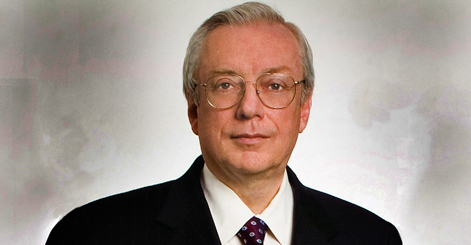LAWYER LIMELIGHT: Richard Kelly of Oblon Spivak
By John Ryan | January 5, 2012 | Lawyer Limelights

Photo source: Oblon Spivak
The posting of the ballot for the Lawdragon 500 Leading Lawyers in America always seems to bring a discussion of which practice groups are the hottest. While the economic environment has negatively affected some types of corporate work this year, intellectual property and litigation practices have remained strong. Many large full-service firms tout their IP groups, but few offer the comprehensive services and technical expertise of specialty shops like Oblon, Spivak, McClelland, Maier & Neustadt, which is based in Alexandria, Va., and has about 100 attorneys.
Senior partner Richard Kelly, who has a degree in chemical engineering, began his career at the U.S. Patent Office and has since handled a wide range of high-profile intellectual property litigation, winning cases for clients like Ricoh Corp., Asahi Glass and Toshiba. Recent clients include Senju Pharmaceutical and Optrex, a maker of flat panel displays. A focus of the firm is representing foreign clients with their intellectual property matters. Foreign companies are becoming increasingly aggressive in bringing claims, which Kelly views as an important trend in the IP field.
Lawdragon: After graduating from law school [Catholic University, 1975], you worked at the U.S. Patent Office as an examiner. How did that experience help you?
Richard Kelly: In terms of starting in patent prosecution, it gave me tremendous insight into how the examiners review applications, what they were confronted with when expediting the patent process. I did that for five years, from 1970 to 1975, and I was exposed to a lot of different things, including interferences. Back then, the examiner was actually deciding interference motions, and I got to see a lot of different issues. It helped when I came into private practice and has carried over to today.
LD: After getting your bachelor's of science degree in chemical engineering, why did you end up pursuing a legal career instead of one in the sciences?
RK: I went to Northeastern University in Boston, which was a co-op school and required that I work in the field while in school. I got a taste of what it was like to be a chemical engineer in industry, and it made me think that another use of my trade would be better for me. Quite frankly, in 1970 we ran into the first of the Nixon recessions and the Patent Office was offering very competitive salaries. I thought it might be nice to go there while seeing how the economy shook out. They also would pay 75-80 percent of the costs of law school. So I said, "Why not?"
LD: What do you see on the horizon in IP litigation? How is it changing?
RK: I don't think the type of litigation will change. What we're going to see is a shift in who is going to be bringing the cases. For a long time the primary movers were American companies, and I think now global companies are coming to the U.S. for litigation. Europeans, of course, are in the forefront now, and we're seeing Japanese, Chinese and Koreans bring disputes to the U.S.
LD: I saw from your website that your firm has a large Japanese practice. Has that been expanding?
RK: We've always had a Japanese practice. The difference, I think, is that we were defending against patent infringement suits and now are shifting to where the Japanese are coming in and enforcing their patents here as part of the competitive landscape. I think we'll see that next with the Koreans, as they seek to protect the markets they develop.
LD: How and why did the firm develop a focus on representing foreign clients?
RK: When Norman Oblon and Marvin Spivak founded the firm, they found that foreign companies, especially Japanese, needed IP representation and filled it. Since then, we have built on this foundation.
LD: Many of the nation's largest firms have IP practices. What does a firm that specializes in the field offer that a larger firm may not?
RK: When you talk about IP litigation and you look at the backgrounds of many large firms, they're quite often not technically oriented and don't really have the specialization in patents that we have. Trademark litigation and patent litigation are different animals. With our firm's cases, we're dealing with clients who come from different countries and cultures.
We've spent 40 years on a practice primarily based on representing foreign companies and developed expertise in communicating with them, helping them understand the practice and procedures here. We bring that to the table. Most clients we represent in litigation have been firm clients for a long time, and it gives us an insight into their businesses and their business needs in terms of their litigation. A lot of big firms don't want to do all of the IP work and don't want to touch patent prosecution. We want to do all of it for our clients. We don't view one aspect any more important than any other.
LD: It helps to represent a company from its beginnings through litigation.
RK: I think the advantage is that we know the client and they know us, we know the technical matters because we get into it with their applications. Attorneys at our firm have a head start in knowing what's going on in a case because we've interacted with the technical people and have those relationships.
Have a suggestion for our Lawyer Limelight? Email Editor John Ryan at john@lawdragon.com

